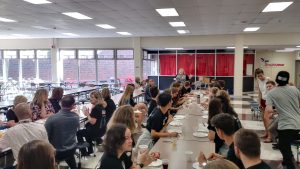WESTFIELD—German exchange students have arrived at Westfield High School this week to experience their own bit of American and western Massachusetts culture and education—including the Big E.
The students are part of the German American Partnership Program (GAPP), a student-exchange program that allows pupils from Germany to visit Westfield and students from Westfield to visit Germany for three-and-a-half weeks. The program began in Westfield High School in 1982, and currently the high school partners with Europa Gymnasium, an advanced high school in Woerth-am-Rhein, Germany.

Students enjoy an American-style breakfast at Westfield High School yesterday, as German exchange students are welcomed to the school as part of the German American Partnership Program.
“I heard the Big E is a big deal here, and lots of fishing. I want to do bass fishing,” one student from Europa Gymnasium said.
The students were greeted yesterday to the school with a breakfast provided by culinary arts teacher Margaret Toomey and her students, which included French toast sticks, pancakes, omelets and fruit. In addition to breakfast, Westfield Mayor Brian Sullivan met with the students and teachers, as well as Superintendent of Westfield Schools Stefan Czaporowski, Westfield High School Principal Charles Jendryzik and others.
“I think GAPP is an outstanding opportunity for our students and the students from Germany to explore different cultures,” Jendrysik said. “It’s an opportunity a lot of schools don’t offer and we couldn’t do it without the support of Westfield families and the community.”
According to Martina Hauser, German teacher at Westfield High School and the person who directs the program for the high school, the exchange works by allowing about 15 students and their teachers to exchange each year, with students from Woerth-am-Rhein—translated into English as “Woerth on the Rhein”—coming to Westfield on the odd years and students from Westfield High School going to Germany on even years.
Christine Gerbetz, an instructor of both English and religion from the Woerth-am-Rhein school and one of two instructors who accompanied the students, said that the students are given exchange partners at the respective schools they are visiting in the program. Through them, a connection is established and the students are provided with a family to live with for three-and-a-half weeks.
“The students exchange emails, they Facebook, Skype,” Frau Gerbetz said. “When they arrive they stay with a host family, experience everyday life with the family, go to school with their partner.”
While here, the students get to experience the American school system, from academic to extra-curricular activities. This can differ for German students, according to Gerbetz, because the two country’s school systems greatly vary.
Some differences, according to Eva Glaser, an English and Spanish teacher who also accompanied the students from Germany, include classes that are not offered in Germany, like culinary courses, as well as an American student’s ability to choose which courses they enroll in.
Glaser also said that instead of students going from one room to another in America, the teachers in Germany are the ones that rove the halls to get from classroom to classroom, while students have one main room for their academics for the day.
According to Glaser, the program also helps students learn now and provides benefits for later in life.
“It’s a great program. Kids learn so much more, not just language but culture,” Glaser said. “It not only helps later in job and life, it broadens horizons.”
And according to Gerbetz, the students may also find that their exchange partners become more than just someone who helped while they were in a new country.
“If they’re lucky, they become friends for a lifetime,” she said.
Kathy Gallogly, a former German teacher at Westfield High School, said the program at Westfield began in 1982, after she taught in Germany as a Fulbright exchange teacher between 1980 and 1981 and heard about GAPP.
Gallogly said she became interested in the program and wanted to utilize it after she returned to teach German in Westfield, but was nervous due to the size of the group of students that could become involved.
“I never took a whole group. I took students on one-week trips but 15 seemed like a daunting task,” she said.
However, after the school’s administration convinced her to do it she took it on, running the exchange program until her retirement in 2010, which was when Hauser took over.
The program, according to Gallogly, began by working with another teacher that was based out of a Hamburg, Germany school, but after four exchanges the teacher left the school. The program then switched to the school in Woerth-am-Rhein.

